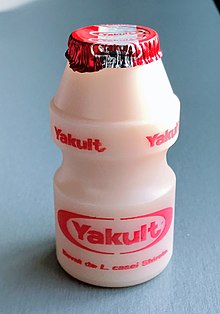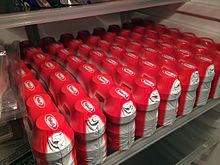Khác biệt giữa bản sửa đổi của “Yakult”
←Trang mới: “{{đang tạo bài}} {{Infobox drink | logo = Yakult-Logo.svg | name = Yakult | image = Yakult drink.jpg | caption = A single ser…” Thẻ: Trình soạn thảo mã nguồn 2017 |
(Không có sự khác biệt)
|
Phiên bản lúc 13:38, ngày 9 tháng 5 năm 2019
 | Trang này đang trong quá trình tạo bài Đây là một bài viết Wikipedia mới được phát triển thông qua những sửa đổi hợp tác liên tiếp.Để tránh mâu thuẫn sửa đổi và sự cố nhầm lẫn khác, người tạo bài yêu cầu trang này không được sửa đổi một cách không cần thiết trong một thời gian ngắn, hay đem bài viết này đi biểu quyết xoá bài trong suốt giai đoạn đầu phát triển bải viết.
|
 | |
 A single serving of Yakult | |
| Phân loại | Drink |
|---|---|
| Hãng sản xuất | Yakult Honsha |
| Hãng phân phối | Yakult Honsha |
| Quốc gia xuất xứ | Japan |
| Ra mắt | 1930s |
| Màu sắc | Off-white |
| Thành phần | Ingredients |
Yakult (ヤクルト Yakuruto) là một đồ uống sữa probiotic ngọt lên men với vi khuẩn Lactobacillus paracasei Shirota, vi khuẩn đầu tiên cải thiện hệ thống ruột người bởi nhà khoa học người Nhật Minoru Shirota vào năm 1930. Nó được bán bởi Yakult Honsha, trụ sở công ty nằm ở Tokyo. Chai sữa đi kèm với một bọc 65 mililít (2,3 fl oz Anh; 2,2 fl oz Mỹ), thường một túi có sáu chai.
Nguyên liệu
Yakult được bán trong 1 chai 65 mL. Nguyên liệu là nước, sữa không kem, Xirô glucose-fructose, saccarose, hương cam quýt, và vi khuẩn sống Lactobacillus paracasei Shirota.[1] Chủng ban đầu được phân loại là Lactobacillus casei nhưng năm 2008 nó được phân loại lại là thuộc về L. paracasei.[1]
Yakult được chuẩn bị bằng cách thêm glucose and glycine to skimmed milk, and heating the mixture at 90 to 95 °C for about 30 minutes. After letting it cool down to 45 °C, the mixture is inoculated with the lactobacillus and incubated for 6 to 7 days at 37 to 38 °C. After fermentation, water, sugar, gums and lactic acid are added.[2]
Health claims
In 2006, a panel appointed by the Netherlands Nutrition Centre to evaluate a marketing request by Yakult found there to be sufficient evidence to justify claims that drinking at least one bottle of Yakult per day might help improve bowel movements for people who tend to be constipated, and might help maintain a healthy population of gut flora.[3]
In 2010, an EFSA panel denied a request by the company to market Yakult as maintaining upper respiratory tract defenses against pathogens (in other words, protection against diseases like the common cold), finding the claim not supported by the evidence.[1]
In 2013, the UK Advertising Standards Authority disallowed an advertisement for Yakult in response to a complaint. It found that while there was sufficient evidence for the claim that "significant numbers of viable [Lactobacillus] survived transit to the gut [after consumption of Yakult]", the advertisement had made claims of general health benefits without providing a specific, referenced claim, as required.[4]
Commercialisation

Yakult was invented in the 1930s in Japan by Minoru Shirota and he helped found Yakult Honsha in order to commercialize it.[5] In some countries, including Japan and India, it is sold door-to-door. It was first sold in the Anglophone world in the 1990s, with Australia selling it first in 1994, the UK in 1996, and the US in 1999.[6]
In February 2018, it was reported that Danone planned to sell €1.5 billion of its Yakult investment, reducing its stake from 21% to 7%.[7][8] The plan was followed by a decline in Yakult's share value.[9] Danone had first bought shares in Yakult in April 2000.[9] The sale was completed in March 2018.[10]
In September 2018, it was reported that the appearance of unlabelled Yakult bottles in the 2018 film To All the Boys I've Loved Before led to a rise in the drink's sales that coincided with a 2.6% increase in share price following the film's release on 17 August.[11][12]
References
- ^ a b c EFSA Panel on Dietetic Products, Nutrition and Allergies (tháng 10 năm 2010). “Scientific Opinion on the substantiation of a health claim related to Lactobacillus casei strain Shirota and maintenance of the upper respiratory tract defence against pathogens by maintaining immune defences pursuant to Article 13(5) of Regulation (EC) N”. EFSA Journal. 8 (10): 1860. doi:10.2903/j.efsa.2010.1860.
 Lay summary: Wallop, Harry (20 tháng 10 năm 2010). “Probiotic drinks do not aid health, Europe says”. The Telegraph.
Lay summary: Wallop, Harry (20 tháng 10 năm 2010). “Probiotic drinks do not aid health, Europe says”. The Telegraph.
- ^ Jost, Rolf (2007), “Milk and Dairy Products”, Ullmann's Encyclopedia of Industrial Chemistry (ấn bản thứ 7), doi:10.1002/14356007.a16_589.pub3, ISBN 978-3527306732
- ^ “Assessment Report: Yakult”. Netherlands Nutrition Centre. 10 tháng 11 năm 2006.
- ^ “ASA Adjudication on Yakult UK Ltd”. Advertising Standards Authority. 15 tháng 5 năm 2013. Truy cập ngày 8 tháng 9 năm 2018.
- ^ Caramia, Giuseppe; Silvi, Stefania (2011). “Chapter 1: Probiotics: From the Ancient Wisdom to the Actual Therapeutical and Neutraceutical Perspective”. Trong Malago, Joshua J.; Koninkx, Jos. F. J. G.; Marinsek-Logar, R. (biên tập). Probiotic Bacteria and Enteric Infections Cytoprotection by Probiotic Bacteria. Dordrecht: Springer Science & Business Media. tr. 6. ISBN 978-9-4007-0386-5.
- ^ Cocozza, Paula (5 tháng 9 năm 2018). “The cult of Yakult: the surprising reason the world's gone wild for the probiotic drink”. The Guardian. Truy cập ngày 8 tháng 9 năm 2018.
- ^ Kar-Gupta, Sudip; Vidalon, Dominique (14 tháng 2 năm 2018). “Danone to sell $1.9 billion Yakult stake in quest to boost shareholder returns”. Reuters. Truy cập ngày 8 tháng 9 năm 2018.
- ^ “Danone to Sell Stake in Japan's Yakult for $1.8 Billion”. Bloomberg. 14 tháng 2 năm 2018. Truy cập ngày 8 tháng 9 năm 2018.
- ^ a b Gretler, Corinne (14 tháng 2 năm 2018). “Yakult Declines After Danone's $1.8 Billion Share Sale Plan”. Bloomberg. Truy cập ngày 8 tháng 9 năm 2018.
- ^ “Danone completes 1.3bn euro sale of its 14% stake in Yakult”. FoodBev Media. 28 tháng 3 năm 2018. Truy cập ngày 8 tháng 9 năm 2018.
- ^ Petter, Olivia (4 tháng 9 năm 2018). “Yakult shares increase following release of Netflix's 'To All the Boys I've Loved Before'”. The Independent. Truy cập ngày 8 tháng 9 năm 2018.
- ^ Balji, Divya (3 tháng 9 năm 2018). “Netflix Teen Comedy Helps Yakult Yogurt Drink Fly Off Shelves”. BloombergQuint. Truy cập ngày 8 tháng 9 năm 2018.
External links
| Wikimedia Commons có thêm hình ảnh và phương tiện truyền tải về Yakult. |
